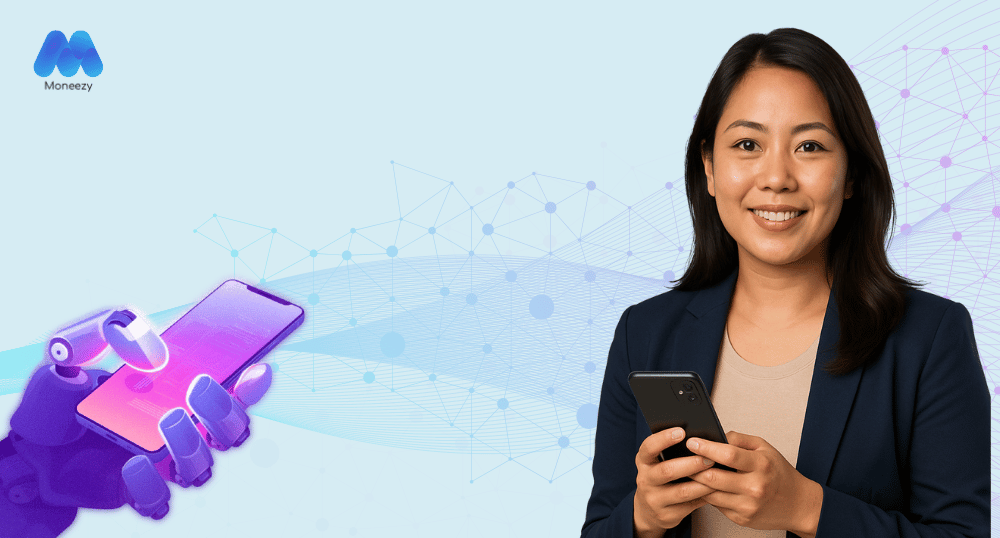Table of contents
- How AI is reshaping Philippine banking (in simple terms)
- AI for Credit scoring & Faster loan approval in the Philippines
- What AI in banking means for you:
- What is Open Finance?
- What AI in banking means for lenders:
- Key considerations for responsible AI use in fintech
- Fraud detection, e‑KYC & Data privacy: Is AI safe?
- Why safeguards matter
- Your rights in the Philippines
- Checklist: Borrowing safely from AI-driven providers
- The future of AI in Banking: BSP Rules, Open Finance & Sandboxes (2025)
How AI is reshaping Philippine banking (in simple terms)
Artificial Intelligence (AI) is helping banks and lenders work faster and smarter. In the Philippines, financial institutions report active AI use in fraud monitoring, chatbots, e‑KYC (digital ID checks), and credit scoring.
AI for Credit scoring & Faster loan approval in the Philippines
AI is transforming how credit is assessed in the Philippines. Instead of relying only on traditional credit scores, AI can analyze transaction patterns, such as whether you pay bills or loans on time, to build a clearer picture of your financial behavior.
What AI in banking means for you:
Quicker decisions: AI assesses risk and process applications in minutes, cutting waiting times dramatically.
Fairer outcomes: With the right data and oversight, AI can judge your application more fairly. This is especially true under the BSP’s Open Finance framework (Circular No. 1122), which allows you to share your financial data securely, with your consent, so lenders can evaluate you more accurately.
What is Open Finance?
Open Finance is a framework from the Bangko Sentral ng Pilipinas (BSP) that lets you securely share financial data across banks and financial institutions. By choosing to share your data, you open the door to more personalized financial products and better loan offers.

What AI in banking means for lenders:
For banks and fintechs, AI brings clear advantages:
Faster loan processing and risk assessment.
More accurate insights from real-time financial data.
Early detection of unusual activity or fraud through pattern recognition.
Key considerations for responsible AI use in fintech
The BSP emphasizes that AI in lending must be used responsibly. Lenders should:
Guard against bias: Make sure AI decisions are fair and transparent.
Monitor “model drift”: Over time, real-world conditions change and AI models can become less accurate. Continuous monitoring and recalibration are essential.
Keep human oversight: AI should support, not replace, human judgment in critical decisions.
Responsible lenders already put these safeguards in place, tracking AI performance, retraining models with fresh data, and ensuring fairness at every step.
When done right, AI not only speeds up approvals but also helps build a more inclusive and trustworthy financial system in the Philippines.
Fraud detection, e‑KYC & Data privacy: Is AI safe?
Beyond faster lending, AI is also reshaping fraud prevention. Real-time monitoring can flag suspicious transactions, while tools like liveness checks and ID scanning (OCR) help confirm who you really are.
These innovations reduce scams and identity theft, but they also raise important questions about privacy, fairness, and oversight.
Why safeguards matter
The Bangko Sentral ng Pilipinas’s (BSP) review notes that while AI’s technical capabilities are advancing quickly, areas like consumer protection and ethics still need stronger maturity. That’s why regulators emphasize robust controls and continued human oversight.
Your rights in the Philippines
Several laws protect borrowers when AI is involved in financial services:
Data Privacy Act (RA 10173): Requires lenders to secure your personal data, obtain valid consent, and allow you to access or correct your information. (Enforced by the National Privacy Commission).
Financial Consumer Protection Act (RA 11765) & BSP Circular 1160: Sets rules on fair treatment, complaint handling, and disclosure duties across banks and other financial providers.
For non-bank lenders: The Lending Company Regulation Act (RA 9474) requires them to secure an SEC Certificate of Authority before operating.
Checklist: Borrowing safely from AI-driven providers
Verify the institution:
Digital banks: must be BSP‑supervised. (According to Reuters, as of Aug 8, 2024, BSP lifted the moratorium to allow up to 10 digital banks; six are currently operating).
Non‑bank lenders: must hold an SEC Certificate of Authority (CA) under RA 9474.
Check privacy notices & permissions: They should align with the Data Privacy Act.
Look for fair disclosures: Transparent fees, total cost, and clear complaint channels are required under RA 11765.
The future of AI in Banking: BSP Rules, Open Finance & Sandboxes (2025)

Looking ahead, regulators are preparing new guardrails for AI in finance:
Upcoming BSP guidance: The BSP has confirmed it is drafting rules on accuracy, accountability, and ethical use of AI in financial institutions (as reported by Inquirer Business in March 2025).
Open Finance Framework (Circular 1122): Lets you securely share financial data, with your consent, to access more personalized financial products.
Regulatory Sandbox (Circular 1153) : Allows banks and fintechs to test new AI-powered services in a controlled setting, balancing innovation with consumer protection.
7 quick FAQs about AI in Banking in the PH
1) Is AI used by Philippine banks today?
Yes. A BSP study show many institutions already use AI for fraud detection, chatbots, e‑KYC, and credit scoring, with more adoption planned.
2) Will AI guarantee faster loan approval?
AI can speed up checks, but it cannot guarantee loan approval. Final loan approval depends on your documents, risk profile, and each lender’s policy.
3) Do regulators in the Philippines audit AI decisions in banking?
Not directly. The BSP and NPC don’t audit every AI model, but they require banks to keep human oversight, ensure fairness, and explain decisions. New BSP rules in 2025 are expected to set stricter standards on accuracy and accountability.
4) What is Open Finance and how does it relate to AI?
Open Finance (BSP Circular 1122) let you share data securely, with your consent. AI then analyzes that data to offer you better and personalized financial products.
5) How do I know if a digital bank is legit?
Digital banks must be licensed by BSP. According to Reuters, in 2024 the central bank reopened the window to allow up to 10 digital banks to operate in the Philippines; six are currently operating.
6) What protects my data if a lender uses AI?
The Data Privacy Act (RA 10173) requires lenders to secure your information, get proper consent, and allow you to correct or access your data.
7) How do I avoid illegal online lending apps?
Borrow only from SEC‑registered lenders with a valid Certificate of Authority (RA 9474).

Desi Rasmussen is a FinTech Communication Specialist with more than eight years of experience in FinTech and SaaS industries. She holds a degree in International Marketing and Communication from the University of Southern Denmark and is passionate about writing content that empowering readers to make smart financial choices.
